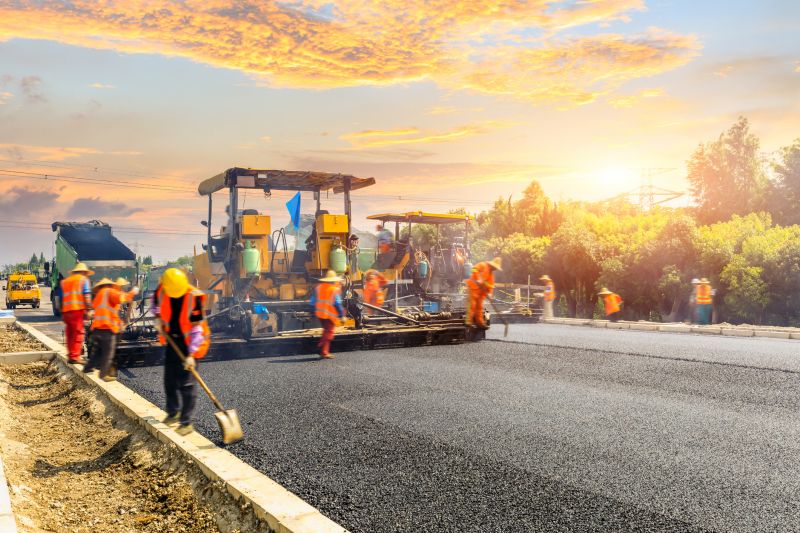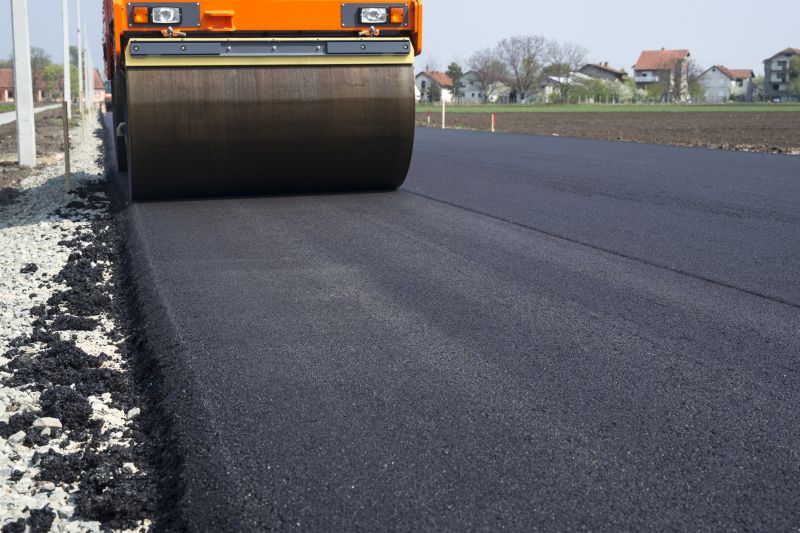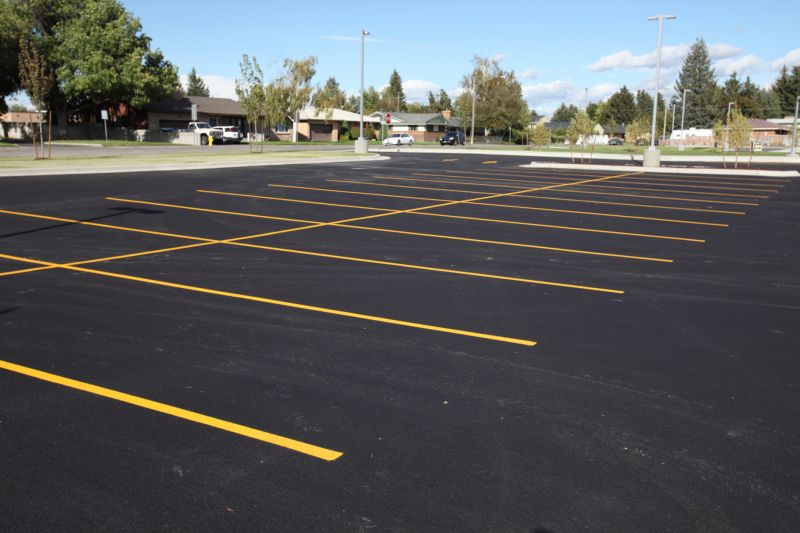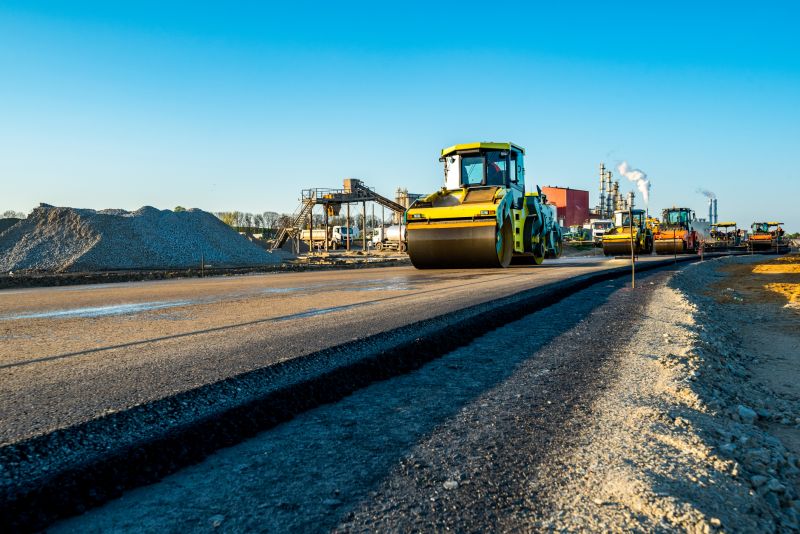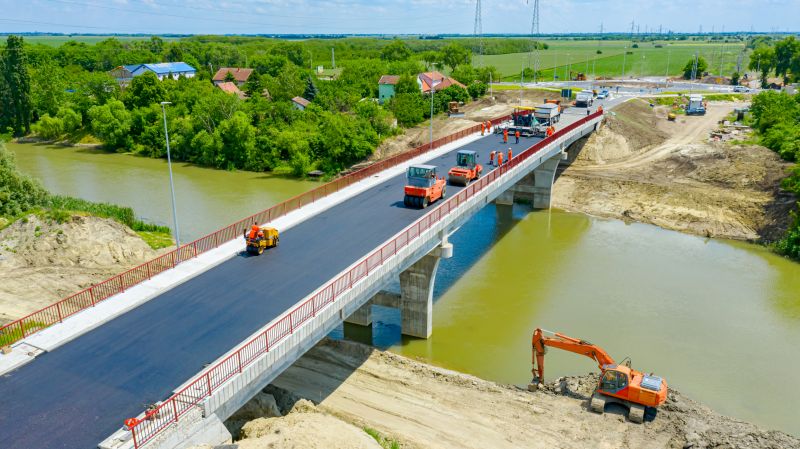Highway Paving Project Supplies and Materials
Get help with your highway paving needs. Fill out the form above and we will connect you with local pros in your area. Highway paving requires a wide range of specialized tools and materials to ensure the successful construction and maintenance of roads. Asphalt is a primary material used in highway paving, providing a durable and smooth surface for vehicles to travel on. To properly handle and transport the asphalt, asphalt trucks equipped with heated tanks are utilized. Additionally, asphalt pavers are essential machines that evenly distribute and compact the asphalt onto the road surface, creating a uniform and long-lasting pavement. Road rollers play a crucial role in the compaction process, ensuring the asphalt is firmly compressed to achieve the desired density and stability. Traffic cones and barriers are necessary to establish work zones and ensure the safety of workers and motorists during construction. Road signs and markings are also important for guiding drivers and indicating changes in traffic flow. Surveying equipment such as total stations and GPS receivers are used to accurately measure and map out the road alignment and grade, ensuring precise construction. Concrete mixers and concrete pumps are employed for areas where concrete is needed, such as bridges and intersections. Crack sealants and sealcoating products are used to maintain and extend the lifespan of existing highways by preventing water penetration and minimizing damage caused by freeze-thaw cycles. Geotextiles and geogrids are utilized as reinforcement materials to enhance the stability and load-bearing capacity of the roadbed. Graders and excavators are used for earthwork and grading, preparing the road surface for pavement. Dust control products are applied to minimize dust emissions during construction, ensuring a safer and cleaner environment for workers and nearby residents. Safety vests, hard hats, and protective gloves are essential personal protective equipment (PPE) for workers engaged in highway paving. Overall, the tools and materials mentioned above are just a glimpse of the extensive range necessary for successful highway paving, showcasing the complexity and precision required in this field.
Asphalt, a versatile and durable material, is widely used for highway paving due to its exceptional performance and cost-effectiveness. It is applied as a smooth, black surface on roadways, providing a safe and comfortable driving experience for motorists. Asphalt's unique properties, such as flexibility, weather resistance, and ability to withstand heavy traffic loads, make it an ideal choice for highway construction. Its smooth texture reduces road noise and offers better skid resistance, enhancing overall safety. Additionally, asphalt's quick installation and repair times minimize traffic disruptions, ensuring efficient and timely completion of highway projects. With its proven track record and numerous benefits, asphalt continues to be the go-to material for highway paving, delivering long-lasting and reliable road surfaces.
Asphalt trucks play a crucial role in highway paving projects. These specialized vehicles are designed to transport and distribute hot asphalt materials efficiently and effectively. Equipped with insulated tanks, asphalt trucks keep the asphalt at the optimal temperature during transportation, ensuring it remains workable and ready for application. During highway paving, asphalt trucks are strategically positioned along the construction site to deliver the hot mix asphalt to the paving equipment. The trucks use a conveyor system or a hydraulic auger to unload the asphalt onto the roadway, ensuring a smooth and consistent distribution. Asphalt trucks offer several advantages for highway paving. They enable the seamless delivery of asphalt materials, minimizing downtime and maximizing productivity. Their large capacity allows for significant quantities of asphalt to be transported at once, reducing the need for frequent refills. Additionally, the insulated tanks help maintain the asphalt's temperature, preventing premature cooling and preserving its quality. Overall, asphalt trucks are essential assets in highway paving projects, facilitating the efficient and precise application of hot mix asphalt, ultimately resulting in durable and well-constructed roadways.
Asphalt pavers are essential machines used for highway paving, ensuring smooth and durable road surfaces. These heavy-duty vehicles are designed to lay asphalt evenly and efficiently, allowing for the construction and maintenance of highways. Asphalt pavers are equipped with a hopper that holds the hot mix asphalt, which is then distributed and spread evenly across the road surface through a screed. The screed levels and compacts the asphalt, creating a uniform and compacted layer. With precise control systems, asphalt pavers can adjust the thickness and width of the asphalt layer, accommodating various road specifications. This technology ensures that highways are built to withstand heavy traffic, harsh weather conditions, and provide a safe and comfortable driving experience for motorists.
Road rollers are heavy construction machines designed to compact asphalt and other materials during the process of highway paving. These powerful vehicles utilize a large, smooth drum or a set of wheels to apply pressure and vibration to the surface, ensuring that the asphalt is properly compressed and adheres to the roadbed. By compacting the layers of asphalt, road rollers help to create a smooth, durable, and long-lasting highway surface that can withstand heavy traffic and environmental conditions. With their ability to efficiently and effectively compact asphalt, road rollers play a crucial role in the construction and maintenance of highways, ensuring the safety and comfort of drivers for years to come.
Traffic cones are an essential tool for highway paving projects. These bright orange cones serve multiple purposes, ensuring the safety and efficiency of the paving process. They are strategically placed along the road to redirect traffic, creating a safe work zone for the construction crew. By clearly delineating the area, traffic cones help prevent accidents and keep drivers and workers safe. Additionally, cones can be used to mark specific areas where pavement needs repair or where new asphalt needs to be laid. This helps the crew identify the exact location, ensuring precise and accurate paving. With their high visibility and versatility, traffic cones play a crucial role in highway paving projects, promoting smooth traffic flow and enhancing overall safety.
Barriers play a crucial role in highway paving projects by ensuring safety, efficiency, and effective traffic management. These sturdy structures act as protective barriers between construction zones and ongoing traffic, minimizing the risk of accidents and injuries. By creating a physical separation, barriers safeguard both workers and motorists, allowing construction activities to proceed smoothly. In highway paving, barriers are strategically placed to guide traffic flow and redirect vehicles away from the construction area, reducing congestion and maintaining a steady traffic flow. Additionally, barriers can serve as a visual deterrent, preventing unauthorized entry into construction zones and enhancing security. These barriers are typically made of durable materials such as concrete or steel, designed to withstand impact and provide a solid barrier against vehicular collisions. They can be easily installed and removed, making them a practical solution for temporary construction projects. Overall, barriers are indispensable tools in highway paving projects, ensuring the safety of workers and motorists while facilitating the smooth execution of construction activities.
Road signs play a crucial role in ensuring the safety and efficiency of highway paving projects. These signs serve as a vital communication tool, providing essential information and warnings to drivers, pedestrians, and construction workers in and around the construction site. By strategically placing road signs, highway paving companies can effectively manage traffic flow, alert drivers to upcoming construction zones, detours, or lane closures, and promote safe driving practices. Additionally, road signs can help guide drivers through complex construction areas, ensuring they navigate the construction site without confusion or accidents. Overall, road signs are an indispensable tool for highway paving projects, enhancing safety, minimizing disruptions, and ensuring a smooth and successful construction process.
Markings play a crucial role in highway paving as they provide clear guidance and enhance safety for motorists. By using specialized materials and techniques, markings are applied on the road surface to convey important information such as lane divisions, turn lanes, pedestrian crossings, and traffic signs. These durable and highly visible markings ensure that drivers can navigate the highway accurately, reducing the risk of accidents and improving traffic flow. Additionally, markings can also include symbols, arrows, and reflective materials to enhance visibility during nighttime or adverse weather conditions. Overall, markings are an essential component of highway paving, contributing to the overall functionality and safety of the road network.
Surveying equipment plays a crucial role in the highway paving process, ensuring accuracy and precision in every step. From initial planning to final construction, surveying equipment helps in various ways. During the planning phase, surveying equipment is used to gather data on the existing terrain, including elevation, topography, and any potential obstacles. This information is then used to create detailed design plans for the highway paving project. Once the construction begins, surveying equipment is used to mark out the boundaries and alignment of the highway, ensuring that it is built according to the specified design. This includes setting up reference points, establishing control lines, and accurately measuring distances and angles. During the actual paving process, surveying equipment helps in setting up the correct grades and slopes for the road surface. This ensures that the highway is built to the desired specifications, with proper drainage and smooth driving conditions. Surveying equipment also plays a crucial role in quality control and inspection. It helps in monitoring the thickness and compaction of the asphalt layers, ensuring that they meet the required standards. Additionally, surveying equipment can be used to measure the smoothness and evenness of the finished pavement, ensuring a high-quality road surface. Overall, surveying equipment is essential for highway paving as it helps in accurate planning, precise construction, and quality control, ultimately leading to safe and durable roadways for drivers.
Total stations are advanced surveying instruments that combine the functions of a theodolite and an electronic distance meter (EDM) to measure angles and distances with high precision. In the context of highway paving, total stations play a crucial role in ensuring accurate and efficient construction. Total stations are used to establish control points and reference lines on the highway site, enabling engineers and surveyors to accurately lay out the alignment and grade of the road. By measuring angles and distances, total stations help determine the precise location of curves, intersections, and other key features, ensuring that the highway is built according to the design specifications. During the paving process, total stations are used to monitor the elevation and slope of the road surface, allowing contractors to achieve the desired grade and smoothness. By continuously measuring and providing real-time feedback, total stations help ensure consistency and quality control throughout the paving operation. Total stations also aid in the verification of as-built conditions, allowing engineers to compare the constructed highway with the original design plans. This helps identify any deviations or errors that may have occurred during construction, enabling timely adjustments and corrections. Overall, the use of total stations in highway paving enhances accuracy, efficiency, and quality in the construction process. By providing precise measurements and real-time monitoring, total stations contribute to the successful completion of highway projects while minimizing errors and rework.
GPS receivers can revolutionize highway paving by providing accurate positioning data for construction equipment and materials. By using GPS receivers, highway paving crews can precisely determine the location and elevation of the road surface, ensuring that the pavement is laid with utmost precision and accuracy. This technology allows for efficient and streamlined construction processes, reducing errors and minimizing the need for manual measurements. With GPS receivers, highway paving projects can be completed more quickly and with higher quality, resulting in safer and smoother roads for drivers.
Concrete mixers are essential equipment in highway paving projects. These versatile machines are specifically designed to efficiently mix various components such as cement, aggregates, water, and additives to create high-quality concrete. By combining these ingredients in precise proportions, concrete mixers ensure the consistency and strength required for durable highway pavements. During highway paving, concrete mixers play a crucial role in batch production. They enable the continuous supply of fresh concrete to the construction site, ensuring a smooth and uninterrupted paving process. With their ability to mix large quantities of concrete in a short time, concrete mixers contribute to increased productivity and reduced construction time. Concrete mixers also provide the flexibility to adjust the concrete mix according to specific project requirements. This allows engineers and contractors to optimize the pavement's characteristics, such as strength, durability, and workability. By tailoring the concrete mix to the specific needs of the highway, concrete mixers help create long-lasting and safe road surfaces. Furthermore, concrete mixers are designed to withstand the demanding conditions of highway paving projects. They are equipped with robust components and advanced features that enhance performance and reliability. This ensures that the concrete mixer can operate efficiently even in challenging environments, such as high temperatures, heavy loads, and continuous operation. In summary, concrete mixers are indispensable tools for highway paving. They enable the precise mixing of concrete ingredients, ensure consistent quality, and contribute to the efficiency and durability of the pavement. With their versatility and reliability, concrete mixers are essential for successful highway construction projects.
Concrete pumps are essential equipment used in highway paving projects to efficiently and effectively deliver concrete to the desired location. These specialized machines are designed to pump concrete through pipes or hoses, allowing for precise placement of the material, even in hard-to-reach areas. In highway paving, concrete pumps offer several advantages. Firstly, they enable a continuous flow of concrete, eliminating the need for manual labor and reducing the overall construction time. This increased efficiency translates into cost savings and faster project completion. Additionally, concrete pumps ensure a consistent and uniform distribution of concrete, resulting in a smooth and durable highway surface. This is particularly important for achieving the desired strength and longevity of the pavement. Moreover, concrete pumps can reach elevated areas, such as bridges or overpasses, with ease. Their versatility allows for seamless pouring of concrete in various shapes and sizes, accommodating the specific requirements of highway construction. In summary, concrete pumps play a crucial role in highway paving by streamlining the concrete placement process, ensuring quality and durability, and enabling efficient construction practices.
Crack sealants play a crucial role in the maintenance and longevity of highway pavements. These specialized materials are designed to effectively seal and repair cracks that develop in the asphalt surface of highways. By filling these cracks, crack sealants prevent water, debris, and other harmful substances from infiltrating the pavement structure, which can lead to further deterioration. When it comes to highway paving, crack sealants are typically applied during the pavement preservation process. After the initial asphalt layer is laid down, cracks may develop over time due to factors like temperature fluctuations, heavy traffic, and natural wear and tear. To ensure the integrity of the pavement, crack sealants are used to seal these cracks, preventing them from expanding and causing more significant damage. The application of crack sealants involves cleaning the cracks thoroughly and then applying the sealant material using specialized equipment. The sealant fills the cracks, creating a waterproof barrier that helps to prevent moisture penetration, freeze-thaw damage, and the formation of potholes. By prolonging the life of the highway pavement, crack sealants contribute to safer and smoother driving conditions for motorists, reducing the need for costly repairs and improving overall road quality. In summary, crack sealants are essential tools in highway paving as they effectively seal and repair cracks in the asphalt surface, protecting the pavement from further deterioration and ensuring its longevity.
Sealcoating products play a crucial role in maintaining and extending the lifespan of highway pavements. Designed specifically for highway paving, these products are formulated to protect and enhance the surface of the pavement, providing a range of benefits. When applied to newly constructed or existing highways, sealcoating products create a protective layer that shields the pavement from the damaging effects of weather, UV rays, and traffic. This protective layer helps prevent cracks, potholes, and other forms of deterioration, reducing the need for costly repairs and increasing the longevity of the pavement. Moreover, sealcoating products enhance the appearance of the highway, providing a smooth and uniform surface that improves driving conditions and enhances safety. They also offer skid resistance, reducing the risk of accidents, especially during wet or slippery conditions. Sealcoating products for highway paving are typically easy to apply, making the process efficient and cost-effective. Regular application of these products can significantly extend the life of the pavement, saving both time and money in the long run. In summary, sealcoating products are essential for highway paving as they protect the pavement from damage, enhance its appearance, improve safety, and increase its lifespan.
Geotextiles are versatile materials that can be effectively used in highway paving projects. These synthetic fabrics are placed within the layers of the pavement to enhance its performance and longevity. Geotextiles act as a barrier, separating the subgrade soil from the base and asphalt layers, preventing the mixing of materials and reducing the risk of structural failure. In highway paving, geotextiles can serve multiple purposes. Firstly, they can act as a reinforcement layer, distributing the load from traffic evenly across the pavement. This helps to reduce rutting and cracking, improving the overall durability of the road surface. Additionally, geotextiles can provide filtration, allowing water to drain through while preventing the migration of fine particles from the subgrade. This helps to maintain the stability of the pavement by preventing the accumulation of water and preserving the integrity of the underlying layers. By incorporating geotextiles into highway paving projects, engineers can improve the performance and lifespan of the road infrastructure. These materials offer cost-effective solutions by reducing maintenance needs, minimizing the risk of pavement distress, and extending the service life of the highway.
Geogrids are innovative materials used in highway paving to enhance the stability, strength, and durability of the road surface. These geosynthetic products consist of a grid-like structure made of high-strength polymers or fiberglass materials. By incorporating geogrids into the pavement layers, they effectively distribute and reinforce the load-bearing capacity of the road, reducing the occurrence of cracks, rutting, and pavement deformation. The geogrids work by interlocking with the aggregate or asphalt layers, creating a composite structure that improves the tensile strength and overall performance of the pavement system. This reinforcement minimizes the lateral movement of the materials, increasing the pavement's resistance to heavy traffic loads, temperature fluctuations, and soil settlement. Additionally, geogrids can help reduce construction costs and extend the lifespan of the road by minimizing the need for excessive excavation, subgrade stabilization, and asphalt thickness. They also facilitate faster construction, as they can be easily rolled out and installed during the paving process. Overall, geogrids provide a cost-effective and sustainable solution for highway paving, ensuring long-lasting and reliable road infrastructure that withstands the challenges of heavy traffic and environmental factors.
Graders are essential equipment in highway paving projects as they play a crucial role in achieving a smooth and even surface. These powerful machines are specifically designed to level and distribute materials, such as asphalt or gravel, during the road construction process. With their adjustable blades and precise control systems, graders efficiently shape the roadbed, ensuring proper drainage and preventing water accumulation. By removing excess materials and filling low spots, graders help create a stable foundation for the pavement, enhancing its durability and reducing the risk of future damage. Their versatility and maneuverability make graders indispensable in achieving high-quality highway paving results, ensuring safe and comfortable journeys for motorists.
Excavators play a crucial role in highway paving projects by efficiently preparing the ground and ensuring a smooth and durable road surface. These versatile machines are used to excavate and remove soil and debris from the construction site, creating a solid foundation for the road. Excavators are also utilized to dig trenches for drainage systems and utilities, grade the terrain to the desired level, and compact the soil to enhance stability. With their powerful hydraulic systems and various attachments, excavators can precisely handle materials like asphalt, gravel, and concrete, facilitating the laying and spreading of these materials on the road surface. Their ability to maneuver in tight spaces and their exceptional digging capabilities make excavators indispensable for highway paving, enabling efficient and effective construction processes.
Dust Control Products play a crucial role in ensuring smooth and efficient highway paving operations. These products are specifically designed to mitigate the dust generated during the construction process, offering numerous benefits. By applying dust control products to the highway surface, they effectively suppress dust particles, creating a safer and healthier work environment for construction crews and nearby residents. During highway paving, dust control products help to minimize the dispersion of fine particles, improving visibility for workers and drivers. This enhanced visibility reduces the risk of accidents and improves overall safety on the construction site. Additionally, by reducing dust emissions, these products contribute to air quality improvement, preventing respiratory issues and minimizing environmental impact. Furthermore, dust control products aid in preventing the erosion of loose soil and aggregate materials, ensuring the stability and longevity of the newly paved highway. By binding the particles together, they enhance compaction, resulting in a more durable and resilient road surface. In summary, the use of dust control products in highway paving operations is vital for creating a safer work environment, improving visibility, protecting air quality, and enhancing the overall quality and longevity of the highway.
Safety vests are essential protective gear used for highway paving projects. These brightly colored vests are designed to enhance the visibility of workers on the job site, ensuring their safety in high-traffic areas. Highway paving crews wear safety vests to increase their visibility to motorists, truck drivers, and equipment operators, preventing accidents and potential injuries. With reflective strips and fluorescent colors, safety vests make workers easily identifiable, even in low-light conditions. By wearing safety vests, highway paving crews can work confidently and efficiently, knowing that they are easily seen and protected on the job.
Hard hats are essential safety gear for workers involved in highway paving projects. These sturdy helmets are specifically designed to protect the head from falling objects, flying debris, and potential head injuries on construction sites. When it comes to highway paving, hard hats play a crucial role in ensuring the safety of workers. They shield workers from hazards such as loose gravel, rocks, and asphalt fragments that may be kicked up during the paving process. Hard hats are also equipped with suspension systems that provide additional shock absorption, reducing the risk of head injuries caused by impacts and falls. By wearing hard hats, highway paving crews can confidently focus on their tasks, knowing that they have reliable protection against potential workplace hazards.
Protective gloves play a crucial role in ensuring safety and efficiency during highway paving projects. Designed with durability and protection in mind, these gloves are specifically engineered to withstand the demanding conditions of asphalt work. When used for highway paving, protective gloves offer several key benefits. Firstly, they shield workers' hands from potential hazards such as hot asphalt, chemicals, and sharp objects. This protection helps prevent burns, cuts, and abrasions, reducing the risk of injuries on the job. Moreover, protective gloves provide an enhanced grip, allowing workers to handle tools and materials with precision and control. This ensures that tasks such as shoveling, raking, and smoothing asphalt can be carried out effectively, resulting in a smoother and more even pavement surface. Additionally, these gloves are often designed to be heat-resistant, enabling workers to handle hot materials without discomfort or burns. This feature is particularly important during highway paving, where workers frequently come into contact with hot asphalt and other heated components. In summary, protective gloves are an essential component of highway paving projects, providing workers with the necessary protection, grip, and heat resistance to carry out their tasks safely and efficiently.
Asphalt
Shop for AsphaltAsphalt, a versatile and durable material, is widely used for highway paving due to its exceptional performance and cost-effectiveness. It is applied as a smooth, black surface on roadways, providing a safe and comfortable driving experience for motorists. Asphalt's unique properties, such as flexibility, weather resistance, and ability to withstand heavy traffic loads, make it an ideal choice for highway construction. Its smooth texture reduces road noise and offers better skid resistance, enhancing overall safety. Additionally, asphalt's quick installation and repair times minimize traffic disruptions, ensuring efficient and timely completion of highway projects. With its proven track record and numerous benefits, asphalt continues to be the go-to material for highway paving, delivering long-lasting and reliable road surfaces.
Asphalt Trucks
Shop for Asphalt TrucksAsphalt trucks play a crucial role in highway paving projects. These specialized vehicles are designed to transport and distribute hot asphalt materials efficiently and effectively. Equipped with insulated tanks, asphalt trucks keep the asphalt at the optimal temperature during transportation, ensuring it remains workable and ready for application. During highway paving, asphalt trucks are strategically positioned along the construction site to deliver the hot mix asphalt to the paving equipment. The trucks use a conveyor system or a hydraulic auger to unload the asphalt onto the roadway, ensuring a smooth and consistent distribution. Asphalt trucks offer several advantages for highway paving. They enable the seamless delivery of asphalt materials, minimizing downtime and maximizing productivity. Their large capacity allows for significant quantities of asphalt to be transported at once, reducing the need for frequent refills. Additionally, the insulated tanks help maintain the asphalt's temperature, preventing premature cooling and preserving its quality. Overall, asphalt trucks are essential assets in highway paving projects, facilitating the efficient and precise application of hot mix asphalt, ultimately resulting in durable and well-constructed roadways.
Asphalt Pavers
Shop for Asphalt PaversAsphalt pavers are essential machines used for highway paving, ensuring smooth and durable road surfaces. These heavy-duty vehicles are designed to lay asphalt evenly and efficiently, allowing for the construction and maintenance of highways. Asphalt pavers are equipped with a hopper that holds the hot mix asphalt, which is then distributed and spread evenly across the road surface through a screed. The screed levels and compacts the asphalt, creating a uniform and compacted layer. With precise control systems, asphalt pavers can adjust the thickness and width of the asphalt layer, accommodating various road specifications. This technology ensures that highways are built to withstand heavy traffic, harsh weather conditions, and provide a safe and comfortable driving experience for motorists.
Road Rollers
Shop for Road RollersRoad rollers are heavy construction machines designed to compact asphalt and other materials during the process of highway paving. These powerful vehicles utilize a large, smooth drum or a set of wheels to apply pressure and vibration to the surface, ensuring that the asphalt is properly compressed and adheres to the roadbed. By compacting the layers of asphalt, road rollers help to create a smooth, durable, and long-lasting highway surface that can withstand heavy traffic and environmental conditions. With their ability to efficiently and effectively compact asphalt, road rollers play a crucial role in the construction and maintenance of highways, ensuring the safety and comfort of drivers for years to come.
Traffic Cones
Shop for Traffic ConesTraffic cones are an essential tool for highway paving projects. These bright orange cones serve multiple purposes, ensuring the safety and efficiency of the paving process. They are strategically placed along the road to redirect traffic, creating a safe work zone for the construction crew. By clearly delineating the area, traffic cones help prevent accidents and keep drivers and workers safe. Additionally, cones can be used to mark specific areas where pavement needs repair or where new asphalt needs to be laid. This helps the crew identify the exact location, ensuring precise and accurate paving. With their high visibility and versatility, traffic cones play a crucial role in highway paving projects, promoting smooth traffic flow and enhancing overall safety.
Barriers
Shop for BarriersBarriers play a crucial role in highway paving projects by ensuring safety, efficiency, and effective traffic management. These sturdy structures act as protective barriers between construction zones and ongoing traffic, minimizing the risk of accidents and injuries. By creating a physical separation, barriers safeguard both workers and motorists, allowing construction activities to proceed smoothly. In highway paving, barriers are strategically placed to guide traffic flow and redirect vehicles away from the construction area, reducing congestion and maintaining a steady traffic flow. Additionally, barriers can serve as a visual deterrent, preventing unauthorized entry into construction zones and enhancing security. These barriers are typically made of durable materials such as concrete or steel, designed to withstand impact and provide a solid barrier against vehicular collisions. They can be easily installed and removed, making them a practical solution for temporary construction projects. Overall, barriers are indispensable tools in highway paving projects, ensuring the safety of workers and motorists while facilitating the smooth execution of construction activities.
Road Signs
Shop for Road SignsRoad signs play a crucial role in ensuring the safety and efficiency of highway paving projects. These signs serve as a vital communication tool, providing essential information and warnings to drivers, pedestrians, and construction workers in and around the construction site. By strategically placing road signs, highway paving companies can effectively manage traffic flow, alert drivers to upcoming construction zones, detours, or lane closures, and promote safe driving practices. Additionally, road signs can help guide drivers through complex construction areas, ensuring they navigate the construction site without confusion or accidents. Overall, road signs are an indispensable tool for highway paving projects, enhancing safety, minimizing disruptions, and ensuring a smooth and successful construction process.
Markings
Shop for MarkingsMarkings play a crucial role in highway paving as they provide clear guidance and enhance safety for motorists. By using specialized materials and techniques, markings are applied on the road surface to convey important information such as lane divisions, turn lanes, pedestrian crossings, and traffic signs. These durable and highly visible markings ensure that drivers can navigate the highway accurately, reducing the risk of accidents and improving traffic flow. Additionally, markings can also include symbols, arrows, and reflective materials to enhance visibility during nighttime or adverse weather conditions. Overall, markings are an essential component of highway paving, contributing to the overall functionality and safety of the road network.
Surveying Equipment
Shop for Surveying EquipmentSurveying equipment plays a crucial role in the highway paving process, ensuring accuracy and precision in every step. From initial planning to final construction, surveying equipment helps in various ways. During the planning phase, surveying equipment is used to gather data on the existing terrain, including elevation, topography, and any potential obstacles. This information is then used to create detailed design plans for the highway paving project. Once the construction begins, surveying equipment is used to mark out the boundaries and alignment of the highway, ensuring that it is built according to the specified design. This includes setting up reference points, establishing control lines, and accurately measuring distances and angles. During the actual paving process, surveying equipment helps in setting up the correct grades and slopes for the road surface. This ensures that the highway is built to the desired specifications, with proper drainage and smooth driving conditions. Surveying equipment also plays a crucial role in quality control and inspection. It helps in monitoring the thickness and compaction of the asphalt layers, ensuring that they meet the required standards. Additionally, surveying equipment can be used to measure the smoothness and evenness of the finished pavement, ensuring a high-quality road surface. Overall, surveying equipment is essential for highway paving as it helps in accurate planning, precise construction, and quality control, ultimately leading to safe and durable roadways for drivers.
Total Stations
Shop for Total StationsTotal stations are advanced surveying instruments that combine the functions of a theodolite and an electronic distance meter (EDM) to measure angles and distances with high precision. In the context of highway paving, total stations play a crucial role in ensuring accurate and efficient construction. Total stations are used to establish control points and reference lines on the highway site, enabling engineers and surveyors to accurately lay out the alignment and grade of the road. By measuring angles and distances, total stations help determine the precise location of curves, intersections, and other key features, ensuring that the highway is built according to the design specifications. During the paving process, total stations are used to monitor the elevation and slope of the road surface, allowing contractors to achieve the desired grade and smoothness. By continuously measuring and providing real-time feedback, total stations help ensure consistency and quality control throughout the paving operation. Total stations also aid in the verification of as-built conditions, allowing engineers to compare the constructed highway with the original design plans. This helps identify any deviations or errors that may have occurred during construction, enabling timely adjustments and corrections. Overall, the use of total stations in highway paving enhances accuracy, efficiency, and quality in the construction process. By providing precise measurements and real-time monitoring, total stations contribute to the successful completion of highway projects while minimizing errors and rework.
GPS Receivers
Shop for GPS ReceiversGPS receivers can revolutionize highway paving by providing accurate positioning data for construction equipment and materials. By using GPS receivers, highway paving crews can precisely determine the location and elevation of the road surface, ensuring that the pavement is laid with utmost precision and accuracy. This technology allows for efficient and streamlined construction processes, reducing errors and minimizing the need for manual measurements. With GPS receivers, highway paving projects can be completed more quickly and with higher quality, resulting in safer and smoother roads for drivers.
Concrete Mixers
Shop for Concrete MixersConcrete mixers are essential equipment in highway paving projects. These versatile machines are specifically designed to efficiently mix various components such as cement, aggregates, water, and additives to create high-quality concrete. By combining these ingredients in precise proportions, concrete mixers ensure the consistency and strength required for durable highway pavements. During highway paving, concrete mixers play a crucial role in batch production. They enable the continuous supply of fresh concrete to the construction site, ensuring a smooth and uninterrupted paving process. With their ability to mix large quantities of concrete in a short time, concrete mixers contribute to increased productivity and reduced construction time. Concrete mixers also provide the flexibility to adjust the concrete mix according to specific project requirements. This allows engineers and contractors to optimize the pavement's characteristics, such as strength, durability, and workability. By tailoring the concrete mix to the specific needs of the highway, concrete mixers help create long-lasting and safe road surfaces. Furthermore, concrete mixers are designed to withstand the demanding conditions of highway paving projects. They are equipped with robust components and advanced features that enhance performance and reliability. This ensures that the concrete mixer can operate efficiently even in challenging environments, such as high temperatures, heavy loads, and continuous operation. In summary, concrete mixers are indispensable tools for highway paving. They enable the precise mixing of concrete ingredients, ensure consistent quality, and contribute to the efficiency and durability of the pavement. With their versatility and reliability, concrete mixers are essential for successful highway construction projects.
Concrete Pumps
Shop for Concrete PumpsConcrete pumps are essential equipment used in highway paving projects to efficiently and effectively deliver concrete to the desired location. These specialized machines are designed to pump concrete through pipes or hoses, allowing for precise placement of the material, even in hard-to-reach areas. In highway paving, concrete pumps offer several advantages. Firstly, they enable a continuous flow of concrete, eliminating the need for manual labor and reducing the overall construction time. This increased efficiency translates into cost savings and faster project completion. Additionally, concrete pumps ensure a consistent and uniform distribution of concrete, resulting in a smooth and durable highway surface. This is particularly important for achieving the desired strength and longevity of the pavement. Moreover, concrete pumps can reach elevated areas, such as bridges or overpasses, with ease. Their versatility allows for seamless pouring of concrete in various shapes and sizes, accommodating the specific requirements of highway construction. In summary, concrete pumps play a crucial role in highway paving by streamlining the concrete placement process, ensuring quality and durability, and enabling efficient construction practices.
Crack Sealants
Shop for Crack SealantsCrack sealants play a crucial role in the maintenance and longevity of highway pavements. These specialized materials are designed to effectively seal and repair cracks that develop in the asphalt surface of highways. By filling these cracks, crack sealants prevent water, debris, and other harmful substances from infiltrating the pavement structure, which can lead to further deterioration. When it comes to highway paving, crack sealants are typically applied during the pavement preservation process. After the initial asphalt layer is laid down, cracks may develop over time due to factors like temperature fluctuations, heavy traffic, and natural wear and tear. To ensure the integrity of the pavement, crack sealants are used to seal these cracks, preventing them from expanding and causing more significant damage. The application of crack sealants involves cleaning the cracks thoroughly and then applying the sealant material using specialized equipment. The sealant fills the cracks, creating a waterproof barrier that helps to prevent moisture penetration, freeze-thaw damage, and the formation of potholes. By prolonging the life of the highway pavement, crack sealants contribute to safer and smoother driving conditions for motorists, reducing the need for costly repairs and improving overall road quality. In summary, crack sealants are essential tools in highway paving as they effectively seal and repair cracks in the asphalt surface, protecting the pavement from further deterioration and ensuring its longevity.
Sealcoating Products
Shop for Sealcoating ProductsSealcoating products play a crucial role in maintaining and extending the lifespan of highway pavements. Designed specifically for highway paving, these products are formulated to protect and enhance the surface of the pavement, providing a range of benefits. When applied to newly constructed or existing highways, sealcoating products create a protective layer that shields the pavement from the damaging effects of weather, UV rays, and traffic. This protective layer helps prevent cracks, potholes, and other forms of deterioration, reducing the need for costly repairs and increasing the longevity of the pavement. Moreover, sealcoating products enhance the appearance of the highway, providing a smooth and uniform surface that improves driving conditions and enhances safety. They also offer skid resistance, reducing the risk of accidents, especially during wet or slippery conditions. Sealcoating products for highway paving are typically easy to apply, making the process efficient and cost-effective. Regular application of these products can significantly extend the life of the pavement, saving both time and money in the long run. In summary, sealcoating products are essential for highway paving as they protect the pavement from damage, enhance its appearance, improve safety, and increase its lifespan.
Geotextiles
Shop for GeotextilesGeotextiles are versatile materials that can be effectively used in highway paving projects. These synthetic fabrics are placed within the layers of the pavement to enhance its performance and longevity. Geotextiles act as a barrier, separating the subgrade soil from the base and asphalt layers, preventing the mixing of materials and reducing the risk of structural failure. In highway paving, geotextiles can serve multiple purposes. Firstly, they can act as a reinforcement layer, distributing the load from traffic evenly across the pavement. This helps to reduce rutting and cracking, improving the overall durability of the road surface. Additionally, geotextiles can provide filtration, allowing water to drain through while preventing the migration of fine particles from the subgrade. This helps to maintain the stability of the pavement by preventing the accumulation of water and preserving the integrity of the underlying layers. By incorporating geotextiles into highway paving projects, engineers can improve the performance and lifespan of the road infrastructure. These materials offer cost-effective solutions by reducing maintenance needs, minimizing the risk of pavement distress, and extending the service life of the highway.
Geogrids
Shop for GeogridsGeogrids are innovative materials used in highway paving to enhance the stability, strength, and durability of the road surface. These geosynthetic products consist of a grid-like structure made of high-strength polymers or fiberglass materials. By incorporating geogrids into the pavement layers, they effectively distribute and reinforce the load-bearing capacity of the road, reducing the occurrence of cracks, rutting, and pavement deformation. The geogrids work by interlocking with the aggregate or asphalt layers, creating a composite structure that improves the tensile strength and overall performance of the pavement system. This reinforcement minimizes the lateral movement of the materials, increasing the pavement's resistance to heavy traffic loads, temperature fluctuations, and soil settlement. Additionally, geogrids can help reduce construction costs and extend the lifespan of the road by minimizing the need for excessive excavation, subgrade stabilization, and asphalt thickness. They also facilitate faster construction, as they can be easily rolled out and installed during the paving process. Overall, geogrids provide a cost-effective and sustainable solution for highway paving, ensuring long-lasting and reliable road infrastructure that withstands the challenges of heavy traffic and environmental factors.
Graders
Shop for GradersGraders are essential equipment in highway paving projects as they play a crucial role in achieving a smooth and even surface. These powerful machines are specifically designed to level and distribute materials, such as asphalt or gravel, during the road construction process. With their adjustable blades and precise control systems, graders efficiently shape the roadbed, ensuring proper drainage and preventing water accumulation. By removing excess materials and filling low spots, graders help create a stable foundation for the pavement, enhancing its durability and reducing the risk of future damage. Their versatility and maneuverability make graders indispensable in achieving high-quality highway paving results, ensuring safe and comfortable journeys for motorists.
Excavators
Shop for ExcavatorsExcavators play a crucial role in highway paving projects by efficiently preparing the ground and ensuring a smooth and durable road surface. These versatile machines are used to excavate and remove soil and debris from the construction site, creating a solid foundation for the road. Excavators are also utilized to dig trenches for drainage systems and utilities, grade the terrain to the desired level, and compact the soil to enhance stability. With their powerful hydraulic systems and various attachments, excavators can precisely handle materials like asphalt, gravel, and concrete, facilitating the laying and spreading of these materials on the road surface. Their ability to maneuver in tight spaces and their exceptional digging capabilities make excavators indispensable for highway paving, enabling efficient and effective construction processes.
Dust Control Products
Shop for Dust Control ProductsDust Control Products play a crucial role in ensuring smooth and efficient highway paving operations. These products are specifically designed to mitigate the dust generated during the construction process, offering numerous benefits. By applying dust control products to the highway surface, they effectively suppress dust particles, creating a safer and healthier work environment for construction crews and nearby residents. During highway paving, dust control products help to minimize the dispersion of fine particles, improving visibility for workers and drivers. This enhanced visibility reduces the risk of accidents and improves overall safety on the construction site. Additionally, by reducing dust emissions, these products contribute to air quality improvement, preventing respiratory issues and minimizing environmental impact. Furthermore, dust control products aid in preventing the erosion of loose soil and aggregate materials, ensuring the stability and longevity of the newly paved highway. By binding the particles together, they enhance compaction, resulting in a more durable and resilient road surface. In summary, the use of dust control products in highway paving operations is vital for creating a safer work environment, improving visibility, protecting air quality, and enhancing the overall quality and longevity of the highway.
Safety Vests
Shop for Safety VestsSafety vests are essential protective gear used for highway paving projects. These brightly colored vests are designed to enhance the visibility of workers on the job site, ensuring their safety in high-traffic areas. Highway paving crews wear safety vests to increase their visibility to motorists, truck drivers, and equipment operators, preventing accidents and potential injuries. With reflective strips and fluorescent colors, safety vests make workers easily identifiable, even in low-light conditions. By wearing safety vests, highway paving crews can work confidently and efficiently, knowing that they are easily seen and protected on the job.
Hard Hats
Shop for Hard HatsHard hats are essential safety gear for workers involved in highway paving projects. These sturdy helmets are specifically designed to protect the head from falling objects, flying debris, and potential head injuries on construction sites. When it comes to highway paving, hard hats play a crucial role in ensuring the safety of workers. They shield workers from hazards such as loose gravel, rocks, and asphalt fragments that may be kicked up during the paving process. Hard hats are also equipped with suspension systems that provide additional shock absorption, reducing the risk of head injuries caused by impacts and falls. By wearing hard hats, highway paving crews can confidently focus on their tasks, knowing that they have reliable protection against potential workplace hazards.
Protective Gloves
Shop for Protective GlovesProtective gloves play a crucial role in ensuring safety and efficiency during highway paving projects. Designed with durability and protection in mind, these gloves are specifically engineered to withstand the demanding conditions of asphalt work. When used for highway paving, protective gloves offer several key benefits. Firstly, they shield workers' hands from potential hazards such as hot asphalt, chemicals, and sharp objects. This protection helps prevent burns, cuts, and abrasions, reducing the risk of injuries on the job. Moreover, protective gloves provide an enhanced grip, allowing workers to handle tools and materials with precision and control. This ensures that tasks such as shoveling, raking, and smoothing asphalt can be carried out effectively, resulting in a smoother and more even pavement surface. Additionally, these gloves are often designed to be heat-resistant, enabling workers to handle hot materials without discomfort or burns. This feature is particularly important during highway paving, where workers frequently come into contact with hot asphalt and other heated components. In summary, protective gloves are an essential component of highway paving projects, providing workers with the necessary protection, grip, and heat resistance to carry out their tasks safely and efficiently.

